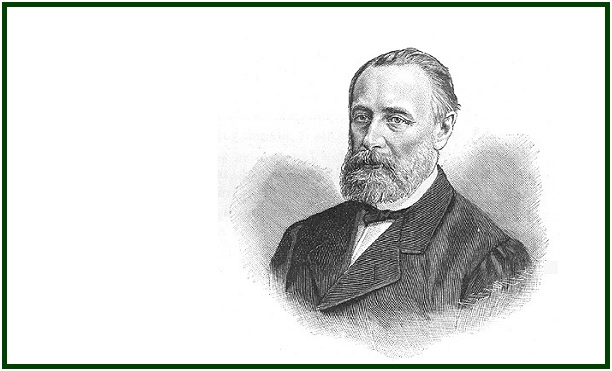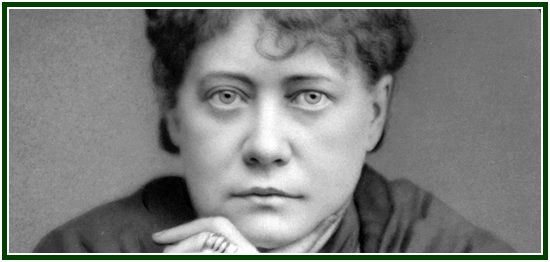
A Few Paragraphs on the Editor of Helena
Blavatsky’s Writings in Russian Language
Boris de Zirkoff

Mikhail Nikiforovich Katkov (1818-1887) was a Slavophile
00000000000000000000000000000000000000000000000000000
The following text is an excerpt from a larger article
by Boris de Zirkoff, entitled “The Writings of H.P.
Blavatsky in Russian”. The text opens the volume “From
the Caves and Jungles of Hindostan”, by Helena P. Blavatsky,
T.P.H., U.S.A., 1975/1983, 719 pages. See pages XXVI-XXIX.
(CCA)
000000000000000000000000000000000000000000000000000000000
After H.P. Blavatsky and Col. H.S. Olcott had settled at Bombay, India, H.P.B. began writing her famous Russian Series entitled “From the Caves and Jungles of Hindostan”. Its sub-title was “Letters to the Fatherland”. This series began appearing in an old and very well-known Russian daily newspaper, the Moskovskiya Vedomosty (Moscow Chronicle, or Moscow Gazette) [1], then under the editorship of the renowned publicist and literary figure, Mikhail Nikiforovich Katkov.
Katkov was born in Moscow on November 1, Old Style, or November 13, New Style, 1818, and lost his father in infancy. Together with his younger brother, he was educated under the immediate supervision of his mother who was of Georgian descent. In 1834, he entered the University of Moscow in the department of literature, graduating with distinction four years later. His literary career began even before graduation, and many of his essays, published in some of the best journals of the day, gave expression to a mystical attitude towards life, and the intimate unity between man and nature. His philosophical views were strongly influenced by Schelling and Hegel. After three years abroad, where he lived in several European countries and became a close friend of Schelling in Berlin, he returned home to find himself in very difficult financial circumstances and without any of his former friends, who did not share his current views. He earned his livelihood by tutoring, and devoted himself to the study of philology, history and classical antiquity. In 1845, he successfully presented his Master’s thesis on Slavonian-Russian philology and became an assistant professor at the Moscow University where he taught logic and psychology for about five years, supporting both his mother and younger brother. In 1850, he suddenly lost his position, due to the fact that the teaching of philosophy in the universities was handed over to priests who were professors of theology.
After another short period of struggle, Katkov was very suddenly offered the position of editor of the famous Moskovskiya Vedomosty (Moscow Chronicle) which he assumed in March, 1851. On a salary of two thousand rubles, with a 25 kopeks’ commission on every new subscriber and free lodging, Katkov considered himself secure; this led to his marrying Princess Sophie Sergeyevna Shalikov, the daughter of a well-known literary man.
Under Katkov’s leadership, the number of subscribers to his newspaper rose from seven to fifteen thousand, and the quality of the paper was greatly enhanced through the participation of new literary talent. To this period of his literary activity belongs Katkov’s basic work entitled Outline of the most ancient Period of Greek Philosophy (1854) which interprets the teachings of Heraclitus, Pythagoras, and others in a symbolic manner, as expressing various abstract truths.
Various governmental restrictions, especially along political lines, and the lack of freedom which Katkov experienced in the conduct of his paper, which actually was the property of the Moscow University, made him decide to seek permission from the authorities to publish his own independent organ. After some tribulations and delays, he was allowed to publish, a couple of times a month, a small journal under the name of Russkiy Vestnik (Russian Messenger) which began to appear in 1856. Katkov resigned from the editorship of the Moscow Chronicle.
The new Journal soon acquired considerable reputation, and some of the finest literary talents in Russia wrote for its pages, such as Tolstoy, Turgenev, Goncharov and others. The number of subscribers rose steadily. Dissatisfied with the way his political department was being conducted, he took charge of it himself, even though he was conscious of not being well versed along these lines. His chief characteristics in that field were his passionate patriotism, so warmly commended by H.P.B. herself on several occasions, his deep religious feeling, and his devotion to the Throne. Some of these attitudes have been gravely misunderstood by later, post-revolutionary writers, who have permitted themselves to classify Katkov among the reactionaries, owing to their own narrow outlook and fanatical adherence to new-fangled ideas. Such an appraisal of Katkov’s figure is historically unsound.
Katkov was in favor of far-reaching reforms in the structure of the State, and was inclined at the time towards the English form of government. He was the proponent of a relatively free press and some of his editorials, as well as his defense of other people’s contributions, repeatedly provoked the ire of the censors. Katkov fought back, and with considerable success. He soon realized that he needed a daily paper. At this time, the University of Moscow decided to lease out its paper, the Moscow Chronicle. Katkov offered for it the sum of 74,000 rubles and the paper passed into his hands for a second time, and began to be issued under his editorship on January 1, 1863. His battle was against the existing bureaucracy. At one time his Chronicle was suspended for a period of two months, but resumed publication. In May, 1866, he obtained an interview with Emperor Alexander II who was visiting Moscow, and was received with much kindness and assured of the Emperor’s special protection.
In 1868, Katkov and his close friend Leontiev [2] opened a new educational establishment, a Lyceum to be run on lines of classical education which had always been a deep-seated conviction of Katkov’s. A special department was devoted to the free education and upkeep of especially promising boys from among the people, and from all parts of Russia, who were to be trained as future teachers.
Katkov was greatly interested in the future of all Slavonic nations, then under the yoke of both Austria and Turkey, and he became the proponent of Slavophilism.[3] His enthusiasm for reforms, however, was gradually undermined by the growing abuses of various liberally-minded people, and his opposition against the violent radical element became a real power after the assassination of the Emperor on March 1, Old Style, or March 13, New Style, 1881.[4] The Moscow Chronicle acquired a position of importance such as no other paper in Russia ever had before. In its pages were discussed the most important problems of the day, and from these discussions matured in time various moves of both internal and foreign policy. Katkov’s own life was completely submerged in, and dedicated to, this activity of public and national service which he looked upon as a perpetual crusade in the interests of the State. He worked day and night, allowing himself no rest of any kind, and finally undermined his health beyond the point where it could be restored. He died at his estate of Znamenskoye, in the Province of Moscow, July 20-August 01, 1887, and was buried in the Alexeyev Monastery in Moscow.
Such was the personality and the background of the man whom H.P. Blavatsky considered to be one of the great patriots of her native country, and who opened the pages of his publications to her pen.
NOTES:
[1] While Moskovskiya Vedomosty can be translated as “Moscow Chronicle” or “Moscow Gazette”, it can also be translated as “Moscow News”. Ms. Susanne Fusso, for instance, uses “Moscow News” in her book “Editing Turgenev, Dostoevsky & Tolstoy, Mikhail Katkov and the Great Russian Novel” – Northern Illinois University Press, U.S.A., 2017, 309 pp., see p. 5 among others. (CCA)
[2] Pavel Mikhailovich Leontiev (1822-1874), a philologist and educator, not a close relative to the philosopher, diplomat and monk Konstantin Nikolayevich Leontiev (1831-1891). (CCA)
[3] Read “Slavophilism and Theosophy”.
[4] See Helena Blavatsky’s article “The Assassination of the Czar”.
000
The article “The Life of Mikhail Katkov” was published as an independent item in the associated websites on 20 December 2022.
000
Read more:
* See other texts on Russia, Theosophy and Helena Blavatsky.
000

Helena Blavatsky (photo) wrote these revealing words: “Deserve, then desire”.
000